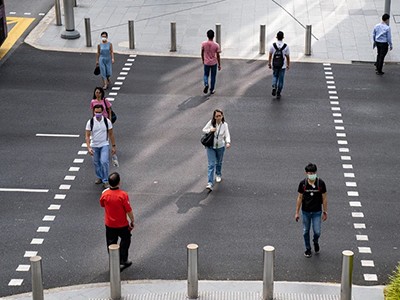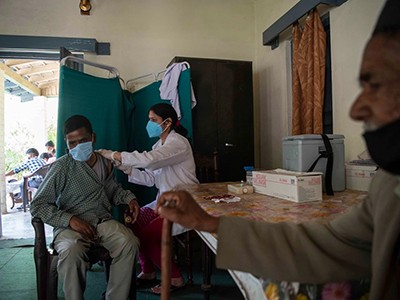Negotiating a pandemic treaty is just the first step — how will countries comply?

Although the negotiations for a pandemic treaty are ongoing, governments should already be considering how they will implement one. As a legal scholar who has acted as a negotiator for the South Korean government in free-trade agreements and advised corporate clients on how to comply with international treaties, I know that signing up is just the start.
I have seen many countries conclude ambitious treaty negotiations, only to fail to comply with the obligations. For example, with regard to free trade, some nations that have promised to avoid subsidies still offer tax breaks to domestic companies; others take advantage of exemptions by delaying renegotiations.
The consequences of failing to adhere to the provisions of a pandemic treaty could be serious, potentially disrupting global vaccine supplies, for instance. A rise in nationalistic and protectionist sentiments would put international cooperation at risk.
A global pandemic treaty is in sight: don’t scupper it
Although the decision-making body of the World Health Organization (WHO) failed to agree on the final wording for a pandemic treaty on 27 May, I am hopeful that differences between countries can soon be overcome. This would avoid repeating the issues associated with the COVID-19 pandemic, such as when wealthy nations prioritized their own access to vaccines at the expense of people in low- and middle-income countries (LMICs).
A pandemic treaty would help to ensure that medicines and health data are shared equitably during global disease outbreaks. High-income countries (HICs) often develop vaccines and treatments by acquiring samples of pathogens from LMICs. During the COVID-19 pandemic, problems arose when HICs stockpiled pharmaceuticals for domestic use, curbing other nations’ supplies. As a consequence, people’s ability to access a vaccine was dictated by their nationality. By March 2022, only 10% of individuals in low-income countries had received the two initial vaccine doses, in stark contrast to 74% in HICs.
A pandemic treaty aims to rectify this inequity. It proposes that the WHO gets access to 20% of pandemic-related tests, treatments and vaccines to distribute as it sees fit. Any royalties it receives as a result would be set aside to fund improving access worldwide. A funding mechanism would also be set up to support pandemic preparedness and response efforts, foster international collaboration and establish ways to settle disputes. Research and development would be expanded, as would the transfer of knowledge and technologies to LMICs.
That’s a lot to ask. How can countries be made to comply? International treaties, unlike domestic laws, have no mechanisms to enforce them. There are no penalties for breaching these laws.
Save lives in the next pandemic: ensure vaccine equity now
Other treaties have included incentives. For example, an independent committee could be established to monitor compliance, as is the case for nuclear or chemical weapons. Although not included in the current draft, such a clause could be added as an amendment in the future.
Sharing information about compliance transparently also increases the likelihood that a nation will do the right thing. Other treaties require member states to notify each other when enacting or amending domestic laws that are relevant to the treaty. The draft of the pandemic treaty includes a requirement for reporting and sharing information, with the frequency and content to be determined later. It remains to be seen whether this will be enough.
Mechanisms for resolving disputes can be set up and sanctions imposed as a penalty for violations. For example, in the World Trade Organization agreement, if a country violates the treaty and refuses to follow the dispute settlement decision, the winning party can retaliate with tariff increases. A similar approach could be used in the pandemic treaty. For example, a LMIC might challenge a HIC that obtains pathogens from it but prevents the WHO from accessing one-fifth of its vaccines. The penalty for not complying, might be a cut of its profits or the imposition of sanctions, such as blocking access to pathogens from the challenging LMIC.
Yet, even by adding all these mechanisms, treaty compliance cannot be guaranteed. And, in my experience, most breaches happen for more mundane reasons.
Different ministries in the same government often struggle to collaborate. Pandemic preparedness might not be at the top of every ministry’s agenda. For example, the treasury might not want to spend money on capacity building in LMICs or on hiring extra health-care personnel in case of a future pandemic.
Similarly, ministries supporting businesses and industry might find it hard to persuade private firms to comply with the treaty, especially if it involves the loss of royalties. Ministries of justice might be reluctant to provide reviews to health ministers after domestic laws are changed.
I recommend that governments set up a central task force to coordinate actions around pandemic preparedness across ministries. This team will need political clout and would ideally be placed close to the country’s leader. A mechanism similar to that of the Office of the United States Trade Representative to manage trade treaty negotiations and enforcement, for example, could be beneficial.
But just ratifying the pandemic treaty is not enough. Leveraging political influence to improve collaboration within governments is also crucial to protect the world from the next pandemic.
Competing Interests
The author declares no competing interests.










